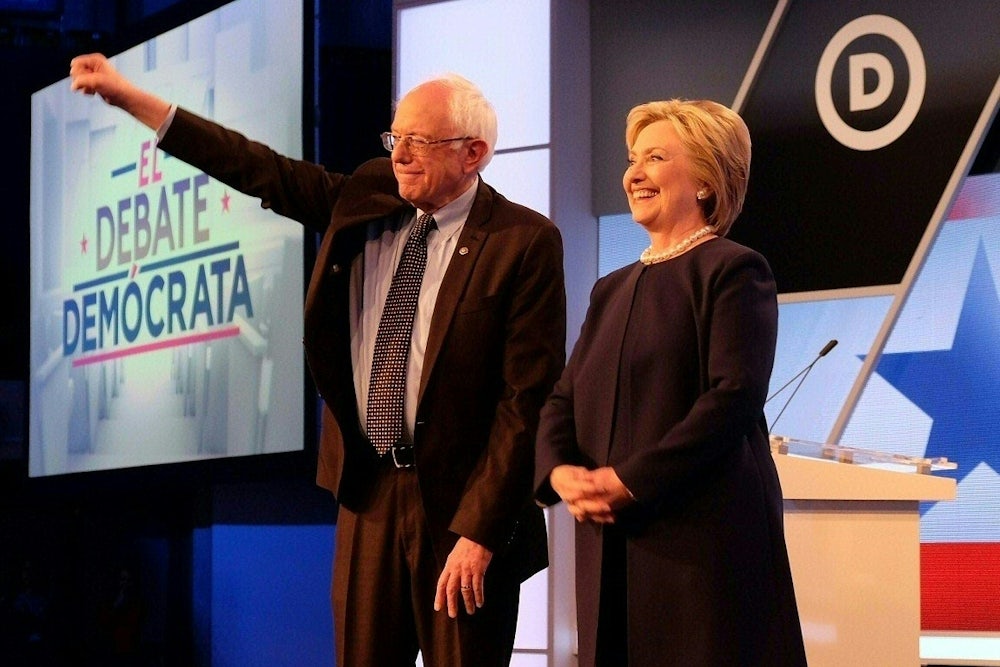The great cliche of the election of 2016 is comparing Bernie Sanders to Donald Trump as disruptive figures changing the fundamental orientation of their parties. There’s some truth to this parallel, but the more fundamental difference between the two candidates may matter more. Trump’s great leverage in the GOP race is that he’s willing to blow up the party if they don’t give them what he wants. He’s repeatedly talked about running a third-party campaign if he’s not given the proper respect, which has allowed him to bully his rivals with impunity. Sanders, by contrast, is not willing to hold the Democratic Party hostage—even though, as a longtime independent, he’s only joined it recently. He has a distinct vision of politics, but he’s not willing tear the party in half to get a chance to enact it.
Sanders has had remarkable staying power—did Hillary Clinton ever imagine she’d still be debating him, much less losing a major primary to him, in March?—and as he showed again at Wednesday night’s Univision/Washington Post debate in Miami, he can stand his ground in a debate. But, so far, his staying power means he’s going to make Clinton fight for every delegate without really endangering her front-runner status, buttressed as it is by the support of superdelegates, those “uncommitted” party officials whose overwhelming pledged support means Sanders needs to outperform Clinton even to get to a tie.
Time and again, he’s framed his criticism of Clinton in general terms, casting her as part of a system rather than an individual miscreant. On Wednesday, again, Sanders refrained from alleging any personal malfeasance. His critique of Clinton is a systemic one. By contrast, when Clinton goes after Sanders, it is on very particular points: votes against gun control and for the Minutemen, failing to vote for for the auto bailout, receiving praise from the Koch brothers.
Clinton’s attacks on Sanders have the hallmark of diligent opposition research, of hard-working staffers poring over the record to find discreditable (or seeming discreditable) facts about an opponent.
Sanders’s critique of Clinton tends to be more generalized—and make you wonder what’s wrong with his own “oppo” team. During Wednesday night’s discussion of Benghazi, for instance, he shrewdly sidestepped the scandal to make a larger point about Clinton’s support for regime change in Libya. So far, so good—and it allowed him to again link Clinton with Henry Kissinger. But Sanders’s response was also a missed opportunity: He failed to bring up Clinton’s support for regime change in Honduras, an issue that’s timely because of recent killings of political dissidents in the country, and one that gave him a chance to plant doubts about his opponent in front of an Hispanic audience.
As the campaign has progressed, Sanders has developed some real skills on the debate stage. Although he still has a tendency to declaim more than debate, he’s developed some modulation in tone. He’s become very good at exploiting his outsized personality to comic effect—for example, by exaggerating and calling attention to his New York pronunciation of “huge.” There was much wit in his cheeky insistence in Miami that Clinton’s speech to Goldman Sachs deserved to be made public because “it must be a wonderful speech” given how much she was paid for it. Yet the very humor of these remarks tended to deflect from the real question of whether Clinton’s tight connections to Wall Street would compromise her in the White House.
As engaging as Sanders’s on-stage persona is, the question remains whether he’s doing enough to draw a sharp contrast between himself and Clinton. This is especially regrettable since his actual policy outlines are refreshingly bold—and do deserve to be presented as a serious alternative to Clinton’s more modest proposals. But you can’t do that without being willing to call her out, in detail, and without wanting to beat your opponent as much as you want to get your points across.
Bold as Sanders’s policies might be, the senator is curiously loyal to the Democratic Party. He’s running a campaign that wants to push the Democrats to the left—but not to do any permanent damage to the party’s chances of winning, nor to leave permanent marks on the centrist/center-left front-runner. This loyalty is high- minded, but it also raises the question of whether Sanders can finally make the jump from being a surprisingly strong second-place candidate to winning the race.
Hear Jeet Heer discuss Bernie Sanders’s politics and persona on episode 5 of Primary Concerns, a New Republic podcast on the 2016 primaries:
